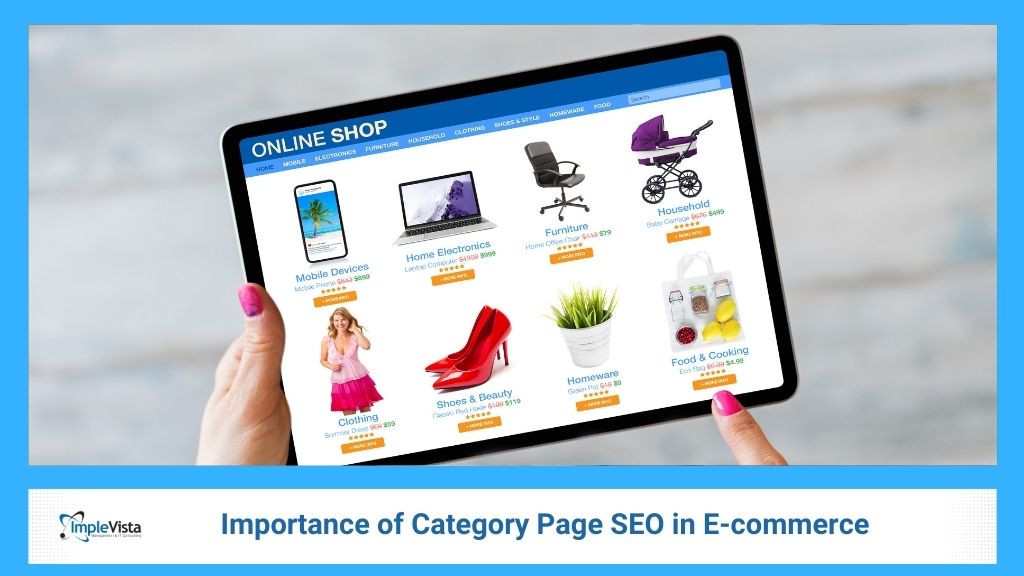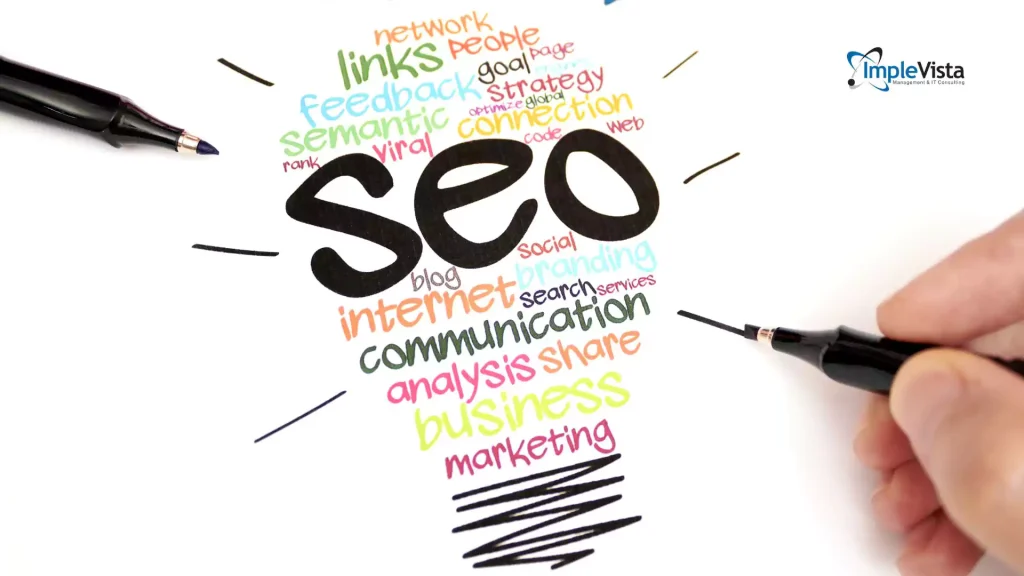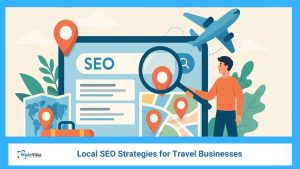Many believe product pages drive sales, but it’s SEO ecommerce category pages that bring high-intent traffic directly to online stores.
In today’s competitive digital landscape, optimizing your e-commerce website goes far beyond product pages. One often overlooked yet essential element is the category page. At Implevista Digital, a leading digital marketing agency in Dhaka, Bangladesh, we specialize in helping businesses grow through smart, strategic optimization. In this article, we’ll break down the 10 important SEO ecommerce category pages and how you can leverage them for better visibility, traffic, and conversions.
What are SEO Ecommerce Category Pages?
Category page SEO refers to the process of optimizing product listing pages on an e-commerce website to improve their visibility on search engines like Google. These pages act as middlemen between the homepage and product pages and hold immense SEO potential. They serve as content-rich hubs that categorize and organize your products, making it easier for both users and search engines to find and understand what your online store offers.
Why is SEO for E-commerce Category Pages Important?
While product pages target very specific keywords, SEO ecommerce category pages target broader, high-volume keywords that attract a wider audience. This makes them perfect for top- and mid-funnel users who are still exploring their options. Optimizing seo ecommerce category pages also improves overall site architecture and supports other SEO elements like internal linking and crawlability. Ignoring these pages is a missed opportunity in your overall e-commerce SEO strategy.
-
Improves Organic Visibility
Optimized SEO ecommerce category pages appear in search results for broad, high-intent keywords like “men’s running shoes” or “organic skincare products.”
- These keywords often have higher search volumes compared to specific product queries
- Helps users find your store even if they’re not searching for a specific product
- Drives consistent, long-term traffic to your site
By including relevant keywords in your SEO ecommerce category pages’ titles, headers, and content, you increase the likelihood of ranking for popular search terms.
-
Enhances User Navigation and Experience
Well-optimized SEO ecommerce category pages improve site architecture and user experience.
- Makes it easier for users to explore your offerings
- Reduces bounce rates as users are guided more intuitively
- Encourages longer time on site by improving engagement
When users can easily find what they’re looking for, they are more likely to convert. This also increases your dwell time, a positive ranking signal to Google.
-
Boosts Keyword Relevance
Search engines rely on relevance to determine rankings. By optimizing your SEO Ecommerce category pages with keywords related to the products listed, you signal to search engines that your content is relevant to user queries.
- Use keywords in headings (H1, H2, etc.), meta tags, and URLs
- Integrate related keywords and semantic phrases naturally into the content
- Avoid keyword stuffing by maintaining a natural, user-friendly tone
This not only improves rankings but also ensures users find what they’re looking for.
-
Supports Internal Linking Structure
SEO ecommerce category pages are perfect hubs for internal links, helping you build a strong website architecture.
- Direct link to relevant product pages
- Link to related blog posts and content guides
- Ensure each internal link adds value to the user journey
Internal links improve site navigation, distribute page authority, and help search engine bots crawl and index more pages.
-
Encourages Higher Click-Through Rates (CTR)
Your SEO ecommerce category pages’ meta title and description are often the first things users see on the search engine results page (SERP).
- Create compelling, benefit-driven meta descriptions
- Include relevant keywords and CTAs
- Use structured data to generate rich snippets
Example Meta Description: “Explore our curated collection of organic skincare products—shop now and get exclusive deals!”
An engaging description entices users to click, increasing CTR and driving more qualified traffic.
-
Increases Conversion Rates
SEO ecommerce category pages that are easy to navigate and visually appealing guide users toward relevant products faster.
- Include product filters and sorting options
- Use high-quality images and compelling calls to action
- Highlight top-rated or best-selling items
A smooth browsing experience leads to higher engagement, lower abandonment rates, and ultimately, better conversions.
-
Provides Rich Content Opportunities
Unlike product pages, seo ecommerce category pages allow more flexibility for long-form content without overwhelming the user.
- Add a short buying guide or style inspiration section
- Include FAQs relevant to the category
- Use this space to build trust and answer user concerns
Content-rich seo ecommerce category pages improve topical relevance and provide a better user experience, which contributes to better rankings.
-
Improves Site Architecture and Crawlability
SEO ecommerce category pages help organize your website logically, making it easier for both users and search engine crawlers to understand your content hierarchy.
- Use breadcrumbs to show the path to the category
- Ensure URLs are clean and descriptive
- Avoid duplicate content with proper canonical tags
A well-structured site ensures that all pages are accessible and indexable, enhancing your overall SEO performance.
-
Targets Broad Commercial Intent
While product pages cater to transactional queries, seo ecommerce category pages are great for targeting users in the research or consideration stage.
- Capture users looking for options or comparisons
- Build trust with informative and well-designed category content
- Guide them deeper into the sales funnel
For instance, someone searching “best gaming laptops” may not be ready to buy immediately, but a well-optimized SEO ecommerce category pages can capture their attention and guide them further.
-
Future-Proof Your SEO Strategy
Product inventory changes frequently, which can lead to broken links and outdated content. SEO ecommerce category pages, on the other hand, are stable and serve as long-term SEO assets.
- They are less likely to be removed or changed
- Can be continually updated with new content and products
- Maintain keyword rankings over time
By investing in seo ecommerce category pages, you’re setting up your e-commerce website for consistent, sustainable growth.
How to Optimize E-commerce Category Pages for SEO
Follow these tried-and-tested e-commerce SEO strategies:
- Use keyword-rich, natural headings (H1, H2s)
- Write unique and engaging category descriptions
- Add high-quality images with keyword-optimized alt text
- Implement breadcrumbs and proper internal linking
- Use schema markup for enhanced visibility on search results
Keep mobile usability in mind—your category pages should be responsive and fast-loading to meet Google’s Core Web Vitals standards.
How Implevista Digital Helps You Optimize Category Pages for SEO
At Implevista Digital, we offer specialized e-commerce SEO services focused on optimizing seo ecommerce category pages to maximize visibility, traffic, and sales. Our services include:
- In-depth keyword research to identify high-volume, relevant terms
- Tailored category content creation that is both SEO-optimized and user-friendly
- On-page SEO enhancements, including metadata, headings, and content structure
- Technical SEO fixes to improve site speed, mobile usability, and crawlability
- Schema markup implementation to boost SERP visibility with rich results
- Smart internal linking strategies that improve user navigation and site architecture
We also ensure your seo ecommerce category pages are designed to meet Core Web Vitals standards—fast-loading, mobile-friendly, and highly engaging. Whether you’re launching a new store or scaling an existing one, our customized SEO strategies help you turn your category pages into powerful growth engines.
FAQs About SEO Ecommerce Category Pages
What is category page SEO?
Category page SEO is the optimization of product listing pages to improve their visibility in search engines.
Why should I optimize category pages instead of just product pages?
Category pages target broader, high-volume keywords that attract more traffic.
How do I choose keywords for category pages?
Use keyword research tools to find high-intent, high-volume phrases relevant to your category.
Can category pages improve conversion rates?
Yes. They guide users to relevant products faster, reducing friction in the buying journey.
Should I add content to category pages?
Yes. A short, keyword-optimized intro or buying guide enhances SEO and UX.
How many words should a category page have?
Aim for at least 300 words of unique content without affecting the product grid.
Is it okay to use duplicate content across categories?
No. Always write unique content to avoid SEO penalties.
Do filters and sorting affect SEO?
Yes. Ensure filters use crawlable URLs and avoid duplicate content issues.
Should I use schema markup on category pages?
Absolutely. It helps enhance your SERP appearance with rich snippets.
How often should I update category pages?
Regularly update to reflect current inventory, trends, and SEO best practices.
Final Thoughts
Optimizing your SEO ecommerce category pages is no longer optional—it’s essential for success. These pages drive organic traffic, improve site usability, and enhance conversions. At Implevista Digital, we help e-commerce businesses across Bangladesh and beyond harness the power of smart SEO.
Ready to Supercharge Your E-commerce SEO?
Contact Implevista Digital today for a free SEO audit and strategy session tailored to your online store. Let’s unlock the full potential of your e-commerce platform together.








